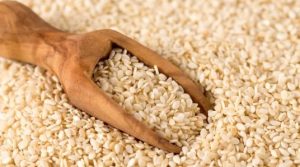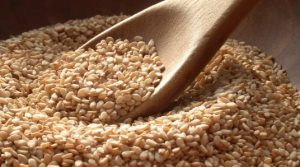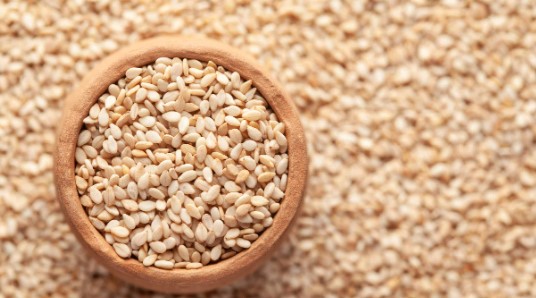Sesame seeds are a healthy ingredient that can be found in a lot of famous foods, like hamburger buns, pancakes, and sushi. Even though these seeds are healthy and good for people to eat, they may not be as good for dogs’ health. Read on to find out if dogs can eat sesame seeds or not.
Table of Contents
Can dogs eat sesame seeds?
Yes, dogs can eat sesame seeds without any problems. In fact, sesame seeds are a great way to get many vitamins and minerals. They are full of fiber and can help lower blood pressure and cholesterol.
They also have a fair amount of calcium. Calcium helps your dog’s bones and teeth grow strong.
It’s also a good source of energy-giving B vitamins and blood-healthy iron.
There are many ways to eat sesame, so let’s take a look at each one separately.
Health Advantages of Sesame Seeds for Dogs
The next question is whether or not it’s good for your dog’s health. Can giving your dog sesame seeds really give them any good nutrients?
Effects on inflammation
There is some proof that sesamin, a chemical found in sesame oil, can help fight inflammation. It’s unlikely that regular, safe amounts of sesame seeds will have any noticeable effect on inflammation in dogs.
Content of fiber
There is a lot of nutrition in sesame seeds. About as much fiber is in one tablespoon of sesame seeds as is in half of a small banana. A spoonful of sesame has way too much fat for your dog, of course. But if your dog doesn’t already eat high-fiber food, a sprinkle of crushed seeds may help them meet their daily fiber needs.

Content of Antioxidants
Antioxidants are chemicals that stop, fix, or undo the damage that is done to the body’s cells. In your dog’s body, the lignans and vitamin E in sesame seeds work as protectors.
Sesame Seeds Could Be Dangerous for Dogs
As we’ve already talked about, if your dog eats a lot of sesame seeds, it can cause a few health problems. Because of a high level of fat, sesame seeds provide energy for humans but cause horrible GI discomfort in dogs. Even though sesame seeds aren’t as bad for a dog as butter is, eating too many of them can still make a dog more likely to get pancreatitis.
Dogs might get pancreatitis if they regularly consume high-fat meals. This makes it hard for the dog’s body to handle food properly, which makes the dog’s stomach inflamed. When the pancreas is swollen, digestive juices can start to leak out of the organ itself. This makes the digestive juices leak out, which can hurt and digest not only the pancreas but also the organs around it. Not only is this process excruciating for dogs, but if it isn’t handled, it can kill them.
Even if a dog doesn’t get pancreatitis from eating a lot of sesame seeds, the high-fat content can still cause pain in the stomach. If these pups eat these tiny seeds, they may get diarrhea, throw up, feel tired, have stomach pain, and have many other uncomfortable GI symptoms.
And finally, some people worry that our dogs might not be able to eat sesame seeds because they have a hard shell. This will be fine if they only eat a few seeds put in their food, but if they eat too many sources, it could bother their digestive system. Even though there isn’t much evidence to back up this worry, it’s still best to avoid all the risks and limit their sesame seed intake.
Way to Give Dogs Sesame Seeds Safely
If you decide to give your dog sesame seeds, it’s best to start small because we don’t know if they can digest them properly. As with any new food, you should start with a small amount—a half-teaspoon for a medium-sized dog—and wait 48 hours to see if your dog has any bad reactions. If everything seems to be going well, try giving a little more or more often. Be aware of any side effects since every dog reacts differently.
Follow these steps to feed your dog sesame seeds safely:
- Talk to a doctor about it. Always check with your vet before feeding your dog any human food.
- If you decide to add sesame seeds to your dog’s food, only give them a small amount, no more than a half teaspoon a day.
- Sprinkle the seeds on their food. You can easily add sesame seeds to your dog’s diet by sprinkling a small amount on their food. When you mix the seeds into their food, your dog’s digestive system gets more food to help it break down the roots.
- Instead, use olive oil. Sesame oil is just as good for your dog as sesame nuts. Sesame oil has a lot of fat, so you don’t want your dog to overeat it, so only put a small amount on their food to try.
- Look out for unwanted effects. After giving your dog sesame seeds for the first time, keep an eye on them for 24 to 48 hours. If they get sick after eating the seeds, stop giving them the seeds and take them to a vet.

Even though any sign that can’t be explained could mean that your dog doesn’t like this new food, most dogs don’t need much more than a half teaspoon of soaked or roasted sesame seeds twice a week. On those days, remember to give your dog less food to make up for the extra calories in the sesame. About 50 calories are in a half teaspoon. Even though this doesn’t sound like much, it’s 10% of a 20-pound dog’s daily calorie limit!
FAQs
What should you do if your dog consumes too many sesame seeds?
Watch for signs of stomach trouble, like throwing up, diarrhea, or losing their hunger. Call your veterinarian immediately if you see any of these symptoms.
Can dogs consume sesame oil?
A dog may safely consume a small quantity of sesame oil.
Can dogs with allergies eat sesame seeds?
It would help if you didn’t give your dog sesame seeds If your dog has allergies.
Conclusion
We don’t know that sesame seeds are bad for dogs. People often say that dogs can’t eat them, but there isn’t any proof of this. Some chemicals in the hull can make it hard for the body to take in the nutrients. If you decide to give your dog sesame seeds, a half-teaspoon of sesame seeds won’t hurt it. Just keep in mind how many calories there are. And if your dog ate some sesame seeds by mistake, they should be fine. Watch out for stomach problems and signs of pancreatitis.





